Ed Gorman's Blog, page 130
May 11, 2013
The Right Jack by Margaret Maron; Rosemary Harris website
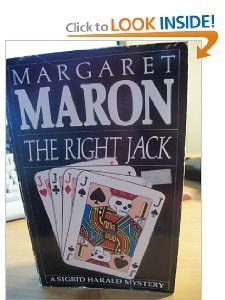
If you want you admire sheer craft and have a great good time while you're doing it I'd recommend reading The Right Jack by Margaret Maron.
Even though the main story revolves around a bomb exploding at a cribbage tournament--and I have zero interest in games of any kind--the story held me tight all the way through. Maron is excellent at setting scenes, finding ironies and deceits in every day conversation, and creating vivid and compelling characters even when they're eccentric. Her Homicide Detective Lieutenant Sigrid Harald has enough psychological ambiguity to really work as a lead.
If you're up for a traditional mystery with a unique setting and a plot that will keep you turning pages, this is it.
CAROLYN HART RECOMMENDS THIS WEBSITE
to see all of it go here: rosemary@rosemaryharris.com
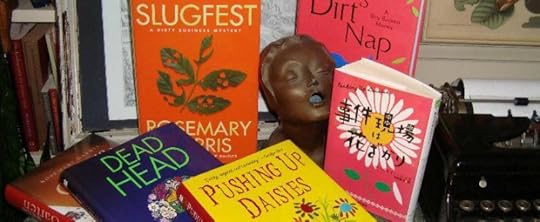
Praise for the books by Rosemary Harris
"Dead Head may be the perfect book for summer." NPR
"An absolute must-read for cozy lovers..." Julia Spencer Fleming, award-winning author of One Was a Soldier
"Sophisticated mix of comedy, romance and murder." Connecticut Post
"Think Diane Mott Davidson's Goldy Schulz or Earlene Fowler's Benni Harper."Omaha World-Herald
"Quirky, original and captivating" Carolyn Hart, award-winning author of Dead By Midnight
"Fast, smart and laugh out loud funny." Harley Jane Kozak, award-winning author of Dating Dead Men
Don't forget, just email me for signed bookplates or if you'd like to schedule a visit or chat with your book club, garden club or library group. Rosemary@rosemaryharris.comTo read more about SLUGFEST and my other mysteries please visit my website www.rosemaryharris.com - and if you enjoy the series, please Like me on Amazon and facebook!http://www.facebook.com/RosemaryHarriswriter
Cheers,
Published on May 11, 2013 13:46
May 10, 2013
One of my favorite crime Bs and favorite directors
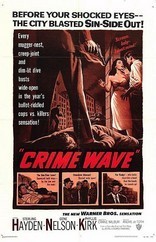
Great cast and great characters. One of the writers was pulp /western and Golden Medal stalwart Richard Wormser.
From Turner Classic Movies:
Crime Wave (1954)
In many ways Crime Wave (1954) exemplifies what is best about Andre De Toth as a director: a strong sense of pacing, a lean visual style, and the ability to draw committed performances from actors. During the Forties and Fifties, De Toth made a number of relatively low budget thrillers and Westerns which represent some of his best work. In fact, he routinely turned down larger budgets and the promise of big-name stars since he felt that "B" pictures offered the kind of creative freedom not possible with a major "A" picture budget. In a later interview he stated, "Why would I want to do a 'million dollar picture?' I didn't need a million headaches. With the lower budgets, most of the time, I was left completely alone." Although he did not direct a large number of films in the noir vein, those he did make stand out, especially the noir-Western Ramrod (1947) and the straight noirs Pitfall (1948) and Crime Wave.
When De Toth originally received the script for Crime Wave from Warner Brothers, it was a more ambitious project starring Humphrey Bogart and Ava Gardner, with a planned shooting schedule of 35 days. De Toth recalled, "I thought that Sterling Hayden in every way would be a better fit. He had a certain rumpled dignity. He wasn't bigger than life like Bogart." After throwing a fit Jack Warner let him use Hayden, but he cut the budget and reduced the shooting schedule to fifteen days. In retrospect, De Toth was surely right--Hayden delivers one of his best performances of the Fifties. Gene Nelson, who plays the young ex-con trying to escape his past, had appeared in a number of musicals in the early Fifties but this was his first major dramatic role. He later appeared in Oklahoma!(1955), but mostly he worked as a television actor and director for the rest of his career. A young Charles Bronson, still using the name Charles Buchinsky, makes an appearance as a member of the criminal gang.
for the rest go here:
http://www.tcm.com/tcmdb/title/71813/...
Published on May 10, 2013 15:03
May 9, 2013
Five Noir Lessons from Charles Williams by Ray Banks
[image error]
From the Mysterious Press website
Ray Banks:
Bill Crider once said that "there's no such thing as a bad Charles Williams novel". Even though I've yet to finish Williams' 22-strong bibliography, I'm inclined to agree. More than that, I'd argue that Charles Williams was one of the best (if not the best), and certainly the most consistent, of the Gold Medal boys.But while the other heroes of the paperback, like Jim Thompson or David Goodis, have been reappraised, republished and canonised, Williams remains sorely underrated and—until now—largely out of print. It's a pity, because out of all of the 50s noir novelists, Charles Williams should be a major influence on modern noir, a subgenre which can sometimes feel choked with cinematic cliché and sophomore nihilism. Williams has plenty to teach the aspiring noir novelist, and even more to offer those of us who may feel that noir has reached the limits of self-parody. And so here, for your delectation and amazement, are five noir lessons to be learned from the work of Charles Williams.Experience is essential.Confession time: I have absolutely zero interest in sailing, swamp fishing, hunting or amateur edaphology. Caveat time: I have absolutely zero interest in the aforementioned subjects unless Charles Williams is writing about them, because this is a man who knows what he's talking about and who keeps his exposition to the point.Williams was an author whose experience was lived rather than learned—his first novel Hill Girl wasn't published until he was 42 years old, after twenty years as both a Merchant Marine and a radio engineer. As a result, what could have been a sub-par Erskine Caldwell rip-off displays an emotional palette far more varied than most debuts. A late start also meant that Williams had his voice—or at least a professionally honed version of it—right out of the gate, which lent a consistency to his follow-up work.
for the rest go here: http://mysteriouspress.com/blog/five-...
Published on May 09, 2013 09:41
May 8, 2013
Pulp Fiction: Max Allan Collins’ Favorite Detective Novels
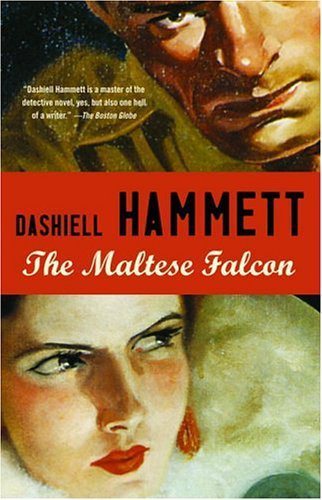
Ed here: I've always thought that this is one of the most perceptive, intelligent top ten mystery lists ever published. I admired the range of choices and tones. From Flavorwire.
Pulp Fiction: Max Allan Collins’ Favorite Detective NovelsBy Kathleen Massara on Sep 29, 2011 3:30pm
Max Allan Collins’ latest mystery, The Consummata (with Mickey Spillane) will be released next Tuesday, so we decided to wrangle him into writing about his favorite lurid PI stories for us. He writes, “First, an admission – not every title on this list was published in a pulp magazine. Some, in fact, were first published in hardcover by respectable, even hoity-toity publishers like Knopf and Random House. But these writers, whether graduates of Black Mask or The Saturday Evening Post, fueled the pulp fiction that followed.”“I could have filled this list with just books by Mickey Spillane, Dashiell Hammett, Raymond Chandler and James M. Cain, and still have been frustrated by omissions,” he continues. ”So I limited myself to one book per author. I regret leaving off several of my favorites, notably Chester Himes, Richard Stark and Jonathan Latimer.” So read on, dear readers, and let us know what books made you want to become a private eye or what covers caught your attention.The Maltese Falcon by Dashiell Hammett
Sam Spade appears in a single novel in which Dashiell Hammett defines, perfects and abandons the private eye yarn. [Editor's note: Sam Spade was the quintessential hard boiled PI -- no contest.]
for the rest go here:
http://flavorwire.com/213601/pulp-fic...
Published on May 08, 2013 13:16
May 7, 2013
Ed's western fiction; Mary Cannon
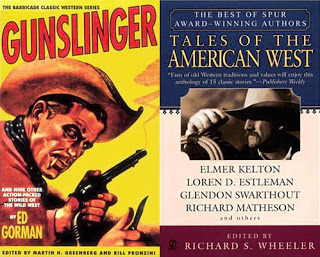
SHORT STORY SUNDAY with Troy D. Smith (From Western Fictioneers)
Today I'm going to highlight the second unit in a three-way tie for my all time favorite western short story -last month I talked about the first, "The Last Boast" by Dorothy Johnson.
This time around it is Ed Gorman's "The Face," winner of the 1993 Spur Award. It was anthologized a couple of times in the 1990s, and I think I may have seen it for the first time in the pages of Louis L'Amour Western Magazine, if I remember correctly.
GUNSLINGER
TALES OF THE AMERICAN WEST
I am going to throw around some superlatives here. Ed Gorman is one of the best writers alive today, in any genre. I'm far from the only person to feel that way, I am sure. And this work is one of his best -in fact, in my opinion it is one of the best short stories written about the American Civil War, ever. It is a profound, disturbing, thought-provoking, poetic, and subtly terrifying tale. In his introduction of the story found in the book mentioned above, Richard S. Wheeler said: "It is the most haunting study of men at war that I have ever read. It brims with horror and beauty and darkness and evil."
I can't really give much away -in large part because Gorman's artistry in this particular work has little to do with plot and everything to do with tone and atmosphere. In a nutshell, though, "The Face" is about the effect on a Confederate military camp when a wounded man is brought in, immobile, an empty shell of a person, really -with his face seemingly permanently frozen into a horrifying expression that defies definition. The reader soon intuits that those features reflect all the horrors and grief of war in human experience. The soldiers, and the reader, are -to put it in contemporary terms -freaked the frack out. As we should be.
NOW AVAILABLE
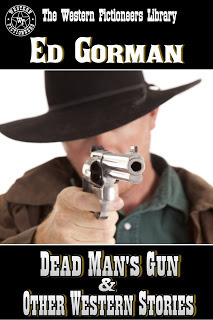 DEAD MAN'S GUN & OTHER WESTERN STORIES by Ed Gorman
DEAD MAN'S GUN & OTHER WESTERN STORIES by Ed GormanFrom acclaimed author Ed Gorman and the Western Fictioneers Library comes this powerful collection of Western stories, many of which have never been reprinted. This volume includes the stories "Dead Man's Gun", "Pards", "The Old Ways", "The Face", "Gunslinger", "Guild and the Indian Woman", "Mainwaring's Gift", "Blood Truth", "Dance Girl", and the article "Writing the Modern Western". Gorman's unforgettable stories feature fine writing, compelling characters, and an undeniable sense of authenticity and realism. You can feel the cold, smell saddle leather and gunsmoke, mourn along with the tragedy-haunted men and women who populate Ed Gorman's West. Read DEAD MAN'S GUN and see why Ed Gorman is one of today's most honored Western authors.
If you haven't read the work of Ed Gorman, this is a good place to start... but so is anything he has written, really.
HAPPY BIRTHDAY MARY CANNON
One of our great good longtime friends. Thanks for that great Care package you sent us when we were at Mayo, Mary.
Published on May 07, 2013 12:44
May 6, 2013
The Worst 'Great Gatsby' Review Lines You Won't Be Seeing on Ads This Week
Ed here: I've never been able to figure out how Baz Luhrmann gets work.He's not a storyteller, he's not
in any meaningful sense an innovator and he has apparently never sat down and talked to a human being for any length of time. Just putting Nick Carraway in a mental hospital is enough of an arrogant and unenlightened misstep to doom the entire picture.
Here is The Atlantic Wire.com:
The first round of movie reviews have arrived for Baz Luhrmann's adaptation of The Great Gatsby — and they are decidedly mediocre. Everyone kind of saw this coming; this was Gatsby all gussied up with lavish designer costumes, 3D, and Jay-Z, after all. We now know that Luhrmann has added the framing device of Nick Carraway telling the story as an alcoholic from a sanitarium, but much of the initial shrugging remains. The consensus seems to be that translating Carraway's first-person narration is a tricky task at which Luhrmann doesn't really succeed, and that Aussie newcomer Elizabeth Debicki deserves praise as Jordan Baker. As for the rest of it, well, let's just say these one-liners won't exactly get blurbed on posters, trailers, or any marketing material whatsoever ahead of Friday's release:"It's as if every bit of creativity dried up the moment the deal was signed." — Drew McWeeny of HitFix"Periodically, as if by accident, something like real emotion pokes up through the film’s well-manicured surface..." — Scott Foundas of Variety. "The picture is filled with an indiscriminate swirling motion, a thrashing impress of 'style' (Art Deco turned to digitized glitz), thrown at us with whooshing camera sweeps and surges with rapid changes of perspective exaggerated by 3-D." — David Denby of The New Yorker"Finally this overproduced slimmest of narratives becomes repetitive, at two hours and 23 minutes, as we revisit the sumptuous set pieces, Gatsby looking longingly across the water toward Daisy's glowing green dock, and hear yet another iteration of the morphing Gatsby backstory until we finally reach Carraway's last words..." — Anne Thompson of Indiewire. "Maguire's slightly aging boyishness has become tiresome by the film's second half and a reduction of Nick's concluding commentary would have helped." — Todd McCarthy of The Hollywood Reporter
Published on May 06, 2013 16:16
May 5, 2013
10 Questions with Duane Swierczynski INTERVIEW BY KEITH RAWSON
10 Questions with Duane SwierczynskiINTERVIEW BY KEITH RAWSON APRIL 30, 2013
IN:
10 QUESTIONS DUANE SWIERCZYNSKI INTERVIEW PULP3inShare
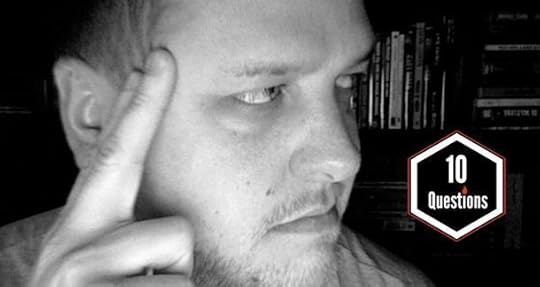
10 Questions with Duane SwierczynskiINTERVIEW BY KEITH RAWSON APRIL 30, 2013
Ed here: I'm a big fan of Duane's and this is an excellent interview
Keith Rawson:
I’ll be the first to admit that I’m a bit of a fanboy when it comes to Duane Swierczynski. I mean, can you really blame me? Philadelphia’s reigning king of pulp is a writing machine, churning out fifteen books since 2002. (And I’m not talking just novels, either. You can’t forget Swierczynski’s two fisted drinking manuals, The Perfect Drink for Every Occasion and The Big Book o’ Beer.) He writes some of the most innovative, off the wall, paranoid thrillers currently being produced—including his latest offering, the third and final book of his Charlie Hardie trilogy, Point & Shoot . Add in all the comic books Swierczynski’s done—including long runs on Iron Fist, Cable, Birds of Prey, Bloodshot, and Judge Dredd—and whatever secret writing projects he has in the hopper, and he probably ranks as one of the busiest crime novelists working. And on top of Duane’s steady diet of words, words, and more words, he’s somehow managed to find the time to teach a class at LitReactor:Like Your Life Depends On It.What was the first story you ever wrote, and what happened to it?A three-page gore-soaked tale about an axe murderer written for my eighth grade teacher—who happened to be a Catholic nun. See, we had this weekly assignment to use 20 spelling words in 20 sentences, so I just wrote a single story using all of the words. Sister Marianne loved it, and I went on to write a dozen more installments. Not sure how I wasn’t expelled (or excommunicated), but that was my first taste of writerly success. I still have those stories, packed away in a plastic container somewhere. God, I hope my kids don’t find them.When you sold your first piece of writing, how did you celebrate?When I was 17 I sold a short-short story to a horror convention magazine and made something like $50. I’m sure I squandered it on horror paperbacks (scored at Marlo Books, a much-missed indie bookshop in Northeast Philly), as well as photocopying, envelopes and postage for inflicting more stories on unsuspecting small press editors all over the country. Back then, my needs were simple.I kill a person for every bad review I receive. SO THINK ABOUT THAT, REVIEWERS… (I can hear the heckler in the back row: Then you musta killed lots and LOTS of people!)Tell us about your process: Pen, paper, word processor, human blood when the moon is full... how do you write?I started out in grade school with a pen and pieces of loose leaf or a marble copybook, eventually graduating to a manual typewriter, then an electric typewriter, then a Commodore 64 word processing program, then one of those all-in-one word processors (with floppy disks and a built-in printer, which I thought was pretty hot shit for 1989), and then started writing on a computer in college. Though recently I’ve been tempted to grab a fistful of pens and a stack of legal pads and crank out a novel by hand. I’m blessed with the ability to write anywhere, anytime, pretty much—I have no “special place” or rituals. I just need to focus for a short while until the world fades away. Getting that focus, however, can sometimes be a bitch.I always start a novel with two Word files: a journal to myself (to record stray plot thoughts, character notes, etc.) and then the actual novel file. The journals would probably be incoherent to anyone else… hell, they’re even incoherent to me after a while. I recently opened up a journal where I was planning a sequel to my first novel, Secret Dead Men, and it was almost gibberish. I have no idea what the hell I was thinking, and that frightens me a bit. Once the novel is well underway, the journal usually falls away, too. It’s like the set of training wheels I need to get started.for the rest go here: http://litreactor.com/interviews/10-q...
Published on May 05, 2013 13:11
May 4, 2013
One of my favorite novels -- FREE ON KINDLE DOWN RIVER by STEPHEN GALLAGHER
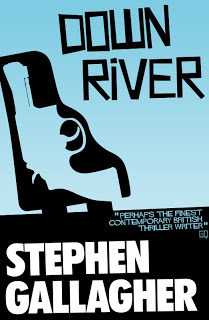
Ed here: This is one of the most original crime novels of any kind I've ever read. It has a range and power I've seldom encountered in suspense fiction. Stephen Gallagher is a master.Down RiverOn May 23rd The Bedlam Detective sees UK publication and in anticipation of the event, we're making the Kindle edition of Down River free for this holiday weekend. You'll have 72 hours in which to grab it, from 12.00am (Pacific Standard Time) on May 4th to around midnight PST on May 6th.
Johnny Mays has the moral conscience of a selfish child in the frame of a plain-clothes police officer. The city is his playground, the rest of us his toys. He likes to find out where we work, where we live, what will scare us most. And Johnny never had a toy he didn't break.
But Johnny starts a car chase, and he pushes it too far. Soon they're fishing for his body at the foot of a dam, and partner Nick Frazier has been left behind.
They were friends, once, a long time ago, and there's no greater anger than that of a friend who feels betrayed. Nick had hoped that he might keep Johnny from going over the edge, in every sense. But Johnny doesn't see it that way.
Johnny's last words still echo in Nick's mind: "I'm going to remember this. I'm coming back for you."
Then the killings start. Killings of people Johnny didn't like. While Johnny's car is dredged up, empty.
"The denouement, thanks to Gallagher's strong writing and excellent characterisations, is unforgettable." (Publishers Weekly)
"An out-and-out novel of paranoia, tension and sharply honed violence which confirms Gallagher as one of Britain's most exciting writers of literate, nerve-shredding thrillers. Down River is Gallagher's most impressive novel to date. He's stripped, oiled and tuned his prose until it growls like a Ferrari, smooth, fast, and very, very powerful. The horror is firmly rooted in reality, yet seems ready at any moment to veer into deep, dark shadows... an unstoppable, gut-wrenching ride to the last page."(Starburst)
"Oktober broke new ground in its blending of genres, its thoughtful characterisation, and its non-stop action. With Down River, Gallagher returns to his own brand of police procedural once more... and he's pulled it off brilliantly." (Mystery Scene)Click here for the Kindle book
Published on May 04, 2013 09:10
The future is no fun: Self-publishing is the worst

The future is no fun: Self-publishing is the worstI published three novels at big houses to good reviews. Now I'm my own publisher, and the media wants no part of meBY TED HELLER FROM SALON
Stick with me on this.In 2001 when my first novel, “Slab Rat,” was published and I was important for about eight weeks, I was asked to write three very short stories for a literary magazine. I believe the maximum amount of time I was allotted for each story was 10 minutes. Sometimes it takes me 10 minutes to get a sentence the way I want it, but I decided to do it. I forget what the other two stories were, but one of them stayed with me: It was about a couple who go to real estate open houses to steal medication.Cut to early spring 2012.Thirty painkillers (prescribed for my bad back) were stolen out of my medicine cabinet. I was certain I knew who did it: someone in my building who had access to our keys. I set a trap for him and removed the remaining painkillers and replaced them with an over-the-counter painkiller that resembled them in color and shape — but certainly did not deliver the same relief. A week later I left my apartment for a mere 10 minutes; when I returned, sure enough, about 30 more were missing. A check of the log revealed who had signed out the keys. As Michael Corleone says to his brother in “The Godfather II”: “I know it was you, Fredo.”Around the same time last year, my third novel, “Pocket Kings,” was published. As best as I can remember, it did not receive one negative review. There were some flat-out raves, too. The Washington Post loved it and it was an Editor’s Choice in the New York Times Book Review. This was the first time that the Times had liked a book of mine. They cold-bloodedly butchered the first and fatally wounded the second.“Pocket Kings” got positive reviews, but the problem is it just didn’t get too many of them. As far as I know, only one newspaper west of the Pecos (the Dallas Morning News), reviewed it. Newspapers don’t cover books anymore, of course. And then there’s the lack of a readership on my part, I’m just not that prominent, etc. But why wouldn’t newspapers or magazines in Las Vegas cover a novel about poker? Why wouldn’t the Huffington Post and Gawker mention a book that drills a thousand new assholes into book publishing? Why wouldn’t every newspaper, magazine and website, after they saw that the Times liked a novel, then grab the baton and run with it and review my novel? After all, that’s what issupposed to happen. That and movie offers and Christina Hendricks on my lap and cases of Cristal and a large advance for the next book.
for the rest go here:
http://www.salon.com/2013/05/03/the_f...
Published on May 04, 2013 09:05
May 3, 2013
The Saint & The Falcon & Raymond Chandler
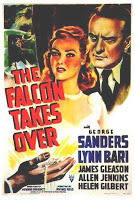
Ed here: I dimly recall seeing the Falcon (later The Saint) series in second run houses in the early Fifties.
I still watch and enjoy them. Here's a fine piece from Classic Film and TV Cafe.
Farewell, My Falcon
Raymond Chandler--the creator of Philip Marlowe, one of literature's great detectives--signed a contract in 1941 for RKO to film his novel Farewell, My Lovely. The price: $2000. According to Frank McShane's The Life of Raymond Chandler, it was a decision the writer later regretted, blaming the "unparalleled stupidity on the part of my New York agent."
Even worse, RKO took Chandler's now-acclaimed novel and adapted it as The Falcon Takes Over (1942), a "B" detective film. It was the third entry in the Falcon film series, based on a gentleman detective created by Michael Arlen in a 1940 short story. In fact, the film's opening credits state the screenplay was "based on the character created by Michael Arlen" and then in smaller letters, it includes "From the novel Farewell, My Lovely by Raymond Chandler."
Surprisingly, the plot adheres pretty closely to Chandler's novel with a big lug named Moose Malloy (Ward Bond) looking for his girlfriend Velma. Moose has recently escaped from the state pen, where he spent five years taking the rap for Velma's boss. Now, he's mad--and that's neck-breaking bad news for anyone getting in his way. After Moose kills a nightclub owner, Gay Lawrence (George Sanders) takes an interest in the case, especially the whereabouts of Velma. He also becomes involved with an alleged necklace theft, a beautiful icy blonde, and a fake psychic. Since this is a plot devised by Raymond Chandler, one can rest assured that somehow it all ties together. (Chandler often interwove plots from previously-written short stories into his novels; for Farewell, My Lovely, the stories were "Try the Girl" and "Mandarin's Jade.")
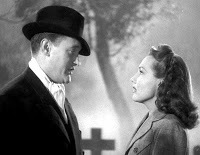 George Sanders as The Falcon,
George Sanders as The Falcon,with Lynn Bari.
for the rest go here: http://www.classicfilmtvcafe.com/
Published on May 03, 2013 09:51
Ed Gorman's Blog
- Ed Gorman's profile
- 118 followers
Ed Gorman isn't a Goodreads Author
(yet),
but they
do have a blog,
so here are some recent posts imported from
their feed.



